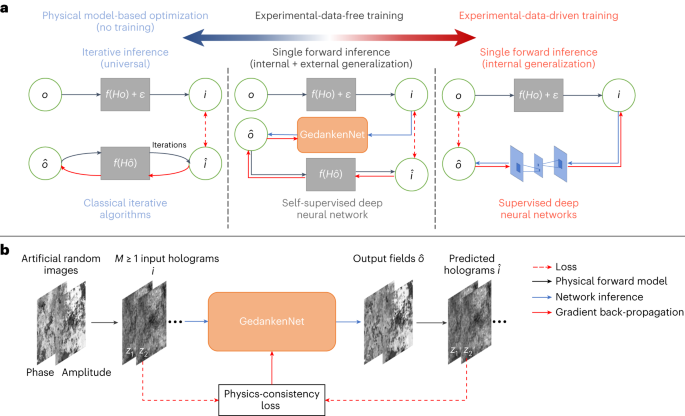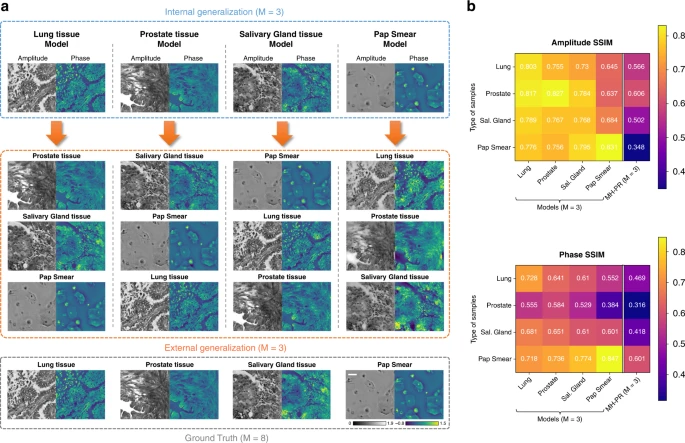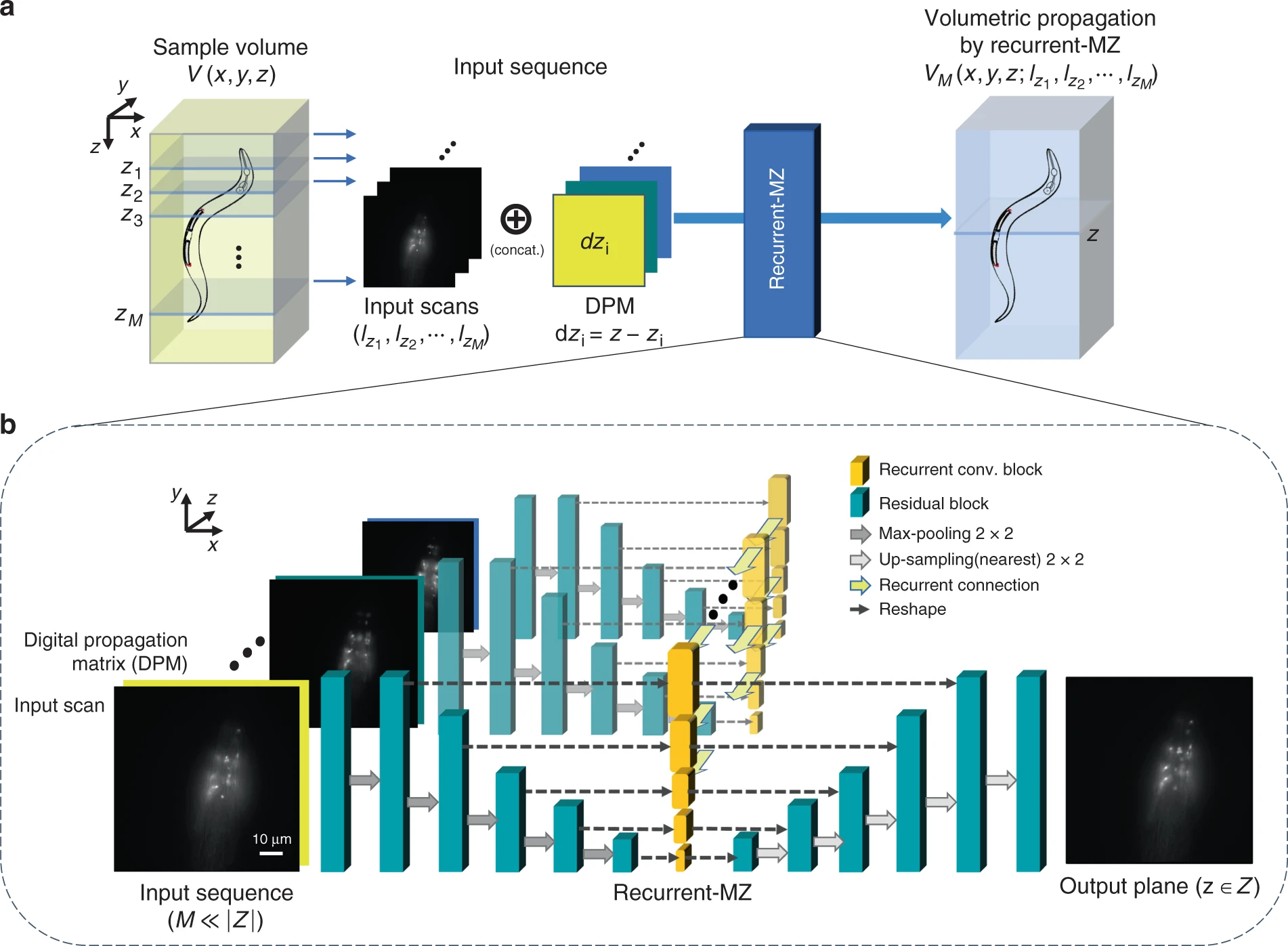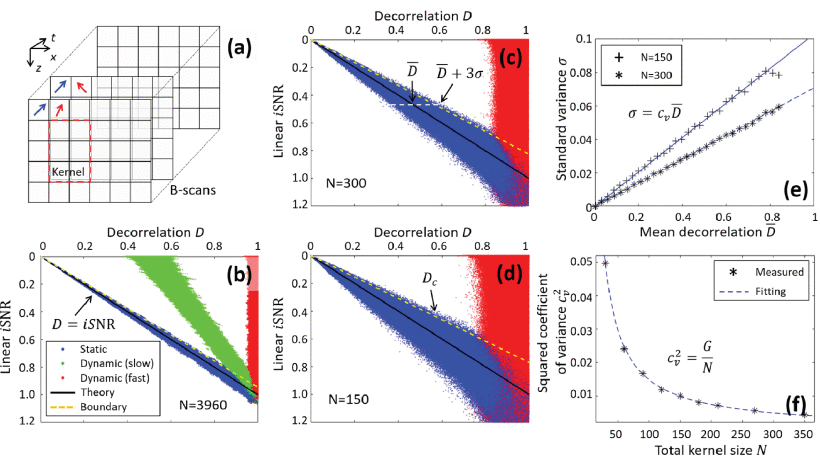
Luzhe Huang
PhD Candidate
Los Angeles, USA
lzhuang0324@ucla.edu
+(1)424-402-2604
Biography
I am a Machine Learning Researcher at TikTok. I received my Ph.D. in Oct 2024 at UCLA, Master of Science in June 2021 at UCLA, and Bachelor of Engineering (BEng) degree in June 2019 at Zhejiang University, China.
I am currently working on content understanding and recommendation systems. My research interests also include computational imaging and microscopy. My goal is to apply advanced machine and deep learning technologies to microscopy imaging, and also enhance the robustness, generalizability and interpretability of models.
News
01/2024
My oral presentation "Self-supervised, physics-informed learning for hologram reconstruction" has been selected as the AI/ML Best Paper in SPIE Photonics West 2024.
10/2023
Our roadmap paper on label-free super-resolution imaging is published on Laser & Photonics Reviews.
08/2023
Our research paper on self-supervised learning (GedankenNet) is published on Nature Machine Intelligence.
07/2023
It is my great honor to receive the Dissertation Year Fellowship from UCLA! Thanks for the support from Prof. Aydogan Ozcan and Prof. Liang Gao.
Selected Publications
Self-supervised learning of hologram reconstruction using physics consistency
Nature Machine Intelligence (IF=25.90)
Existing applications of deep learning in computational imaging and microscopy mostly depend on supervised learning, requiring large-scale, diverse and labelled training data. Here we report a self-supervised learning model, termed GedankenNet, that eliminates the need for labelled or experimental training data, and demonstrate its effectiveness and superior generalization on hologram reconstruction tasks. Without prior knowledge about the sample types, the self-supervised learning model was trained using a physics-consistency loss and artificial random images, and successfully generalized to experimental holograms of unseen biological samples after its self-supervised training. This self-supervised learning of image reconstruction creates new opportunities for solving inverse problems in holography, microscopy and computational imaging.
Fourier Imager Network (FIN): A deep neural network for hologram reconstruction with superior external generalization
Light: Science and Applications (IF=20.26)
Deep learning-based image reconstruction methods have achieved remarkable success in phase recovery and holographic imaging, but their generalization to new types of samples remains a challenge. Here we introduce a deep learning framework, termed Fourier Imager Network (FIN) based on spatial Fourier transform modules that process the spatial frequencies of its inputs using learnable filters and a global receptive field. Compared with existing convolutional deep neural networks used for hologram reconstruction, FIN exhibits superior generalization to new types of samples, while also being much faster in its image inference speed. Beyond holographic microscopy and quantitative phase imaging, FIN and the underlying neural network architecture might open up various new opportunities to design broadly generalizable deep learning models in computational imaging and machine vision fields.
Recurrent neural network-based volumetric fluorescence microscopy
Light: Science and Applications (IF=20.26)
Volumetric imaging of samples using fluorescence microscopy plays an important role in various fields including physical, medical and life sciences. In this work we report a deep learning-based volumetric image inference framework that uses 2D images that are sparsely captured by a standard wide-field fluorescence microscope at arbitrary axial positions within the sample volume. Our work demonstrates the first application of recurrent neural networks in microscopic image reconstruction and provides a flexible and rapid volumetric imaging framework.
SNR-Adaptive OCT Angiography Enabled by Statistical Characterization of Intensity and Decorrelation With Multi-Variate Time Series Model
IEEE Trans. Med. Imaging (IF=11.04)
In OCT angiography (OCTA), decorrelation computation has been widely used as a local motion index to identify dynamic flow from static tissues, but its dependence on SNR severely degrades the vascular visibility, particularly in low-SNR regions. We developed a multi-variate time series (MVTS) model, and based on this model, derived a universal asymptotic linear relation of decorrelation to inverse SNR (iSNR) and a linear classifier, termed as ID-OCTA.
Publication list
Journals
- Y. Ma, J. Park, L. Huang et al. Light-field tomographic fluorescence lifetime imaging microscopy. Proceedings of the National Academy of Sciences 121.40, e2402556121 (2024)
- M.J. Fanous, P. Casteleiro Costa, C. Isil, L. Huang, Neural network-based processing and reconstruction of compromised biophotonic image data. light: Science & Applications 13, 231 (2024).
- Y. Li, N. Pillar, J. Li, T. Liu, D. Wu, S. Sun, G. Ma, K. de Haan, L. Huang et al. "Virtual histological staining of unlabeled autopsy tissue." Nature Communications 15, 1684 (2024)
- V.N. Astratov, Y.B. Sahel, Y.C. Eldar, L. Huang, A. Ozcan et al. "Roadmap on Label-Free Super-Resolution Imaging." Laser & Photonics Reviews 2200029 (2023)
- J. Park, B. Bai, D. H. Ryu, T. Liu, C. Lee, Y. Luo, M. J. Lee, L. Huang et al. Artificial intelligence-enabled quantitative phase imaging methods for life sciences. Nature Methods 20, 1645-1660 (2023)
- L. Huang, J. Li, X. Ding et al. Cycle-Consistency-Based Uncertainty Quantification of Neural Networks in Inverse Imaging Problems. Intelligent Computing 2: 0071 (2023)
- L. Huang, H. Chen, et al. Self-supervised learning of hologram reconstruction using physics consistency. Nature Machine Intelligence 5, 895-907 (2023)
- H. Chen, L. Huang et al. eFIN: Enhanced Fourier Imager Network for Generalizable Autofocusing and Pixel Super-Resolution in Holographic Imaging. IEEE JSTQE, 29, 4, 1-10 (2023)
- Y. Zhang, L. Huang et al. Virtual Staining of Defocused Autofluorescence Images of Unlabeled Tissue Using Deep Neural Networks. Intelligent Computing 9818965 (2022)
- L. Huang, X. Yang, et al. Few-shot Transfer Learning for Holographic Image Reconstruction using a Recurrent Neural Network. APL Photonics 7, 070801 (2022)
- H. Chen, L. Huang et al. Fourier Imager Network (FIN): A deep neural network for hologram reconstruction with superior external generalization. Light: Science & Applications 11, 254 (2022)
- L. Huang, T. Liu, et al. Holographic image reconstruction with phase recovery and autofocusing using recurrent neural networks. ACS Photonics 8, 6, 1763-1774 (2021)
- X. Yang, L. Huang, Y. Luo, et al. Deep-learning-based virtual refocusing of images using an engineered point-spread function. ACS Photonics 8, 7, 2174-2182 (2021)
- L. Huang, H. Chen, Y. Luo, et al. Recurrent neural network-based volumetric fluorescence microscopy. Light: Science & Applications 10, 62 (2021)
- Y. Luo, L. Huang, Y. Rivenson, A. Ozcan, Single-shot autofocusing of microscopy images using deep learning. ACS Photonics, 8, 2, 625-638 (2021)
- L. Huang, Y. Fu, R. Chen, et al. SNR-adaptive OCT angiography enabled by statistical characterization of intensity and decorrelation based on multi-variate time series model. IEEE Transactions on Medical Imaging, 38, 11, 2695-2704 (2019)
- L. Huang, X. Wang, Y. Yuan, S. Gu, Y. Shen, An improved algorithm of NLOS imaging based on Bayesian statistics. JOSA.A 36, 5, 834-838 (2019)
- L. Huang, T. Fang, Q. Shuai, Calibration and imaging of a CT system, Chinese Journal of Engineering Mathematics 34, 1 (2017)
Conferences
- L. Huang, H. Chen, T. Liu, and A. Ozcan, "Self-supervised, physics-informed learning for hologram reconstruction" in SPIE Photonics West 2024 (AI/ML Best Paper)
- H. Chen, L. Huang, T. Liu, and A. Ozcan, "Deep Learning-enabled Autofocusing and Pixel Super-Resolution in Holographic Imaging," in Frontiers in Optics + Laser Science 2023 (FiO, LS), Technical Digest Series (Optica Publishing Group, 2023), paper FTu6D.2.
- Y. Zhang, L. Huang, T. Liu, K. Cheng, K. de Haan, Y. Li, B. Bai, and A. Ozcan, "Neural network-based virtual staining of defocused autofluorescence images of label-free tissue," in CLEO 2023, Technical Digest Series (Optica Publishing Group, 2023), paper ATu3Q.1.
- L. Huang, H. Chen, T. Liu, and A. Ozcan, "Self-supervised neural network for holographic microscopy (invited)," in Conference on Lasers and Electro-Optics, Technical Digest Series, Technical Digest Series (Optica Publishing Group, 2023), paper ATu3Q.4
- L. Huang, X. Yang, T. Liu, A. Ozcan, "Few-shot transfer learning using a recurrent neural network for hologram reconstruction," Proc. SPIE PC12389, Quantitative Phase Imaging IX, PC123890B (16 March 2023)
- H. Chen, L. Huang, T. Liu, A. Ozcan, "Deep learning-based hologram reconstruction with superior external generalization," Proc. SPIE PC12389, Quantitative Phase Imaging IX, PC123890P (16 March 2023)
- Y. Zhang, L. Huang, T. Liu, K. Cheng, K. de Haan, Y. Li, B. Bai, A. Ozcan, "Deep learning-based virtual staining of defocused autofluorescence images of label-free tissue," Proc. SPIE PC12373, Optical Biopsy XXI: Toward Real-Time Spectroscopic Imaging and Diagnosis, PC123730H (6 March 2023)
- H. Chen, L. Huang, T. Liu, and A. Ozcan, "A broadly generalizable deep neural network for rapid phase recovery and hologram reconstruction," in Frontiers in Optics + Laser Science 2022 (FIO, LS), Technical Digest Series (Optica Publishing Group, 2022), paper FM5C.2.
- L. Huang, X. Yang, T. Liu, A. Ozcan, "Few-shot generalizable hologram reconstruction model using a recurrent neural network (RNN) (Conference Presentation)," Proc. SPIE PC12204, Emerging Topics in Artificial Intelligence (ETAI) 2022, PC122040H (4 October 2022)
- X. Yang, L. Huang, Y. Luo, Y. Wu, H. Wang, Y. Rivenson, and A. Ozcan, "3D Virtual Refocusing of Point Spread Function (PSF) Engineered Images Using Cascaded Neural Networks," in Conference on Lasers and Electro-Optics, Technical Digest Series (Optica Publishing Group, 2022), paper STh5J.5.
- L. Huang, T. Liu, X. Yang, Y. Luo, Y. Rivenson, and A. Ozcan, "Phase Recovery and Holographic Imaging using Recurrent Neural Networks (RNNs)," in Conference on Lasers and Electro-Optics, Technical Digest Series (Optica Publishing Group, 2022), paper ATh1D.5
- X. Yang, L. Huang, Y. Luo, Y. Wu, H. Wang, Y. Rivenson, A. Ozcan, "Three-dimensional virtual refocusing of point-spread function engineered images using cascaded neural networks," Proc. SPIE PC12019, AI and Optical Data Sciences III, PC1201906 (9 March 2022)
- L. Huang, T. Liu, X. Yang, Y. Luo, Y. Rivenson, A. Ozcan, "Holographic image reconstruction with phase recovery and autofocusing using recurrent neural networks," Proc. SPIE 11970, Quantitative Phase Imaging VIII, 119700C (2 March 2022)
- X. Yang, L. Huang, Y. Luo, Y. Wu, H. Wang, Y. Rivenson, A. Ozcan, "Virtual refocusing of fluorescence images using an engineered point-spread function and deep learning," Proc. SPIE 11804, Emerging Topics in Artificial Intelligence (ETAI) 2021, 1180425 (1 August 2021)
- L. Huang, Hanlong Chen, Yilin Luo, Yair Rivenson, Aydogan Ozcan, "Convolutional recurrent neural network-enabled volumetric fluorescence imaging," Proc. SPIE 11804, Emerging Topics in Artificial Intelligence (ETAI) 2021, 1180411 (1 August 2021)
- L. Huang, Y. Luo, Y. Rivenson, and A. Ozcan, "Volumetric fluorescence microscopy using convolutional recurrent neural networks," in Conference on Lasers and Electro-Optics, J. Kang, S. Tomasulo, I. Ilev, D. Müller, N. Litchinitser, S. Polyakov, V. Podolskiy, J. Nunn, C. Dorrer, T. Fortier, Q. Gan, and C. Saraceno, eds., OSA Technical Digest (Optica Publishing Group, 2021), paper STh2D.3.
- L. Huang, Y. Luo, Y. Rivenson, and A. Ozcan, "Neural network-based single-shot autofocusing of microscopy images," in Conference on Lasers and Electro-Optics, J. Kang, S. Tomasulo, I. Ilev, D. Müller, N. Litchinitser, S. Polyakov, V. Podolskiy, J. Nunn, C. Dorrer, T. Fortier, Q. Gan, and C. Saraceno, eds., OSA Technical Digest (Optica Publishing Group, 2021), paper ATu4L.2.
- L. Huang, Y. Luo, Y. Rivenson, A. Ozcan, "Deep-learning-based volumetric imaging in fluorescence microscopy," Proc. SPIE 11649, Three-Dimensional and Multidimensional Microscopy: Image Acquisition and Processing XXVIII, 116490G (5 March 2021)
- L. Huang, Y. Luo, Y. Rivenson, A. Ozcan, "Deep learning-based single-shot autofocusing of microscopy images," Proc. SPIE 11647, Imaging, Manipulation, and Analysis of Biomolecules, Cells, and Tissues XIX, 116470Y (5 March 2021)



